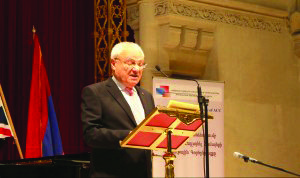 By Aram Arkun
By Aram Arkun
Mirror-Spectator Staff
LONDON — The Reform and Unity Movement of the Armenian Democratic Liberal Party (ADL), after three conventions, recently announced that its headquarters would be moved to the Republic of Armenia. In order to shed some light on this movement and the significance of its actions, Dr. Hratch Kouyoumjian of London, the secretary of the Reform and Unity Movement, spoke at length with the Mirror.
Dr. Kouyoumjian was born in Beirut and went to the Armenian General Benevolent (AGBU) Hovagimian-Manougian School there, at which his father was a teacher (as well as a leader of the ADL). After obtaining his first degree from the American University of Beirut, he went to England for his doctorate, which he obtained from the University of Hull, England. He graduated as an expert in management, which led him to sustainable development and then science, technology and innovation policies.
Kouyoumjian became a high level civil servant at the United Nations. For the past 10 years, he has been working in his fields of specialization, and the promotion of Agenda 21, a UN action plan. He has been a consultant with UNESCO in Paris, and a research scientist at the International Atomic Energy Agency in Monaco. He speaks Armenian, Arabic, English, French and Turkish.
He is active in conferences and travels frequently for work in Europe, the Middle East, Armenia and the Far East. Over the past ten years he has been an active member of various oceanographic networks, and has held various positions in the Middle East, such as member of the Lebanese National Council for Scientific Research. He has established scientific journals, and published books, articles and reports in his field.









